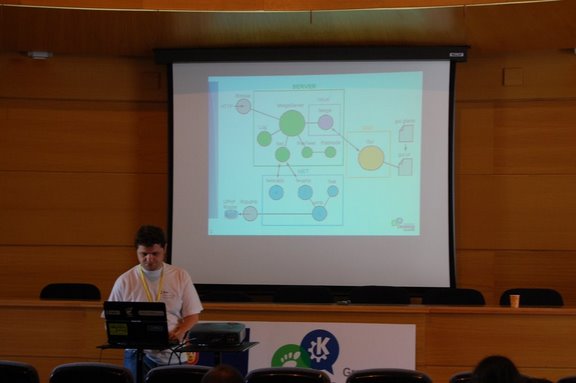Today I’ve finally figured out how to syncronize my contacts, calendar, bookmarks, tasks and notes between my Sony Ericsson K800i mobile phone and Gmail, learning how to synchronize them with the data utility in sonyericsson.com in the way.
I’ve googled around and read so many web pages that I can’t list all them here. I’ll just post the result here as a recipe for people having a similar phone model:
For sonyericsson.com:
Just go to http://www.sonyericsson.com/cws/cws/community , create an account, tell them your phone model and number and follow the instrucions. They will send you an SMS, but if you don’t receive it (as it was for me), there’s a link to get the connection instructions by hand. These are my settings:
- Server address: http://sync.sonyericsson.com/sync
- User name: A random alphanumeric sequence that they create for you
- Password: Another random alphanumeric sequence that they create for you
- Connection: Choose your default internet connection here
- Applications: Contacts, Calendar, Tasks, Notes, Bookmarks (choose the ones you want to sync)
- Apps. settings: Use the following database names for each one of the services: con, cal, task, pnote, bmark
- Sync interval: disabled
- Remote initialization: Always ask
- Remote security: leave it empty
For Gmail:
- Server address: https://m.google.com/syncml
- User name: Your gmail name without “@gmail.com”
- Password: Your gmail password
- Connection: Choose your default internet connection here
- Applications: Contacts, Calendar, Tasks, Notes, Bookmarks (choose the ones you want to sync)
- Apps. settings: Use the following name for the contacts database: contacts. i don’t know if the other services are available.
- Sync interval: disabled
- Remote initialization: Always ask
- Remote security: leave it empty
I hope this post to be useful for other people struggling around out there to do the same task. I’d liked very much to have found it while I was googling. If this info is useful to set up other phone models/brands with slight variations, I’d also like to know about them. Please, post a comment about your own experience.
Enjoy it! 🙂
 This weekend I’ve taken advantage of our hackfest sessions at Igalia winter summit and have prepared a new “Halloween” version of Meiga.
This weekend I’ve taken advantage of our hackfest sessions at Igalia winter summit and have prepared a new “Halloween” version of Meiga.
